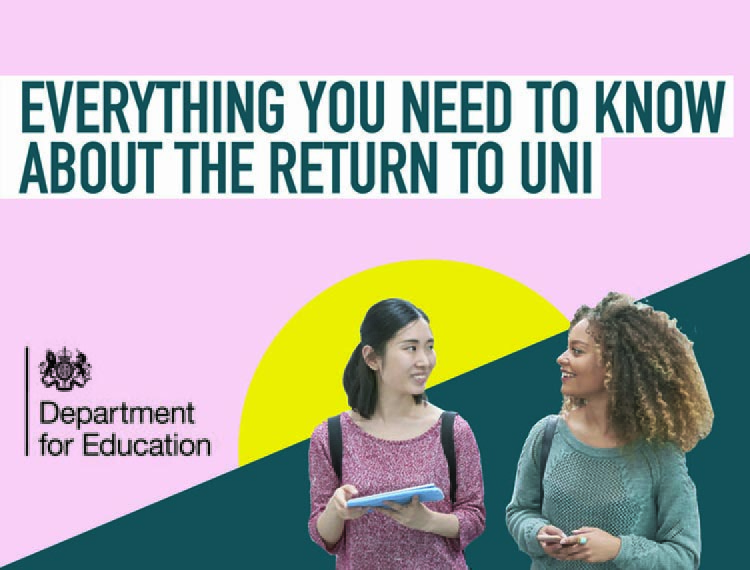All remaining university students to return to in-person teaching from 17 May 2021

University students received a boost today (Monday 10 May) with the launch of a new employment and skills guide alongside the confirmation that all remaining students can return to in-person teaching from the 17 May.
Prime Minister Boris Johnson announced that the country can progress to Step 3 of the Government’s roadmap which will see a further easing of restrictions on indoor mixing and social contact.
Some students, including those doing practical courses such as science and engineering, and who need to access specialist facilities and equipment, are already back on campus.
Before the remaining students return, they are encouraged to take a test either through home or community testing at least one day before they travel back to their term time accommodation.
Upon arrival at their term time accommodation, all students and staff will be encouraged to take three supervised Lateral Flow Devices (LFD) tests 3 to 4 days apart at an on-campus asymptomatic testing site, and will be expected to be tested two times a week throughout the rest of the summer term.
Home testing kits will be available to help those who are unable to attend the on-campus testing facilities. Further advice and support for universities is included in the DfE updated guidance.
In addition to confirming the return for all remaining students, the Department for Education has worked with the Office for Students (OfS) and universities to deliver support and advice for those students who have graduated during the pandemic and might not have had access to the opportunities needed to take the next steps in their lives.
The Graduate Employment and Skills Guide brings together a broad range of tools, advice and resources into a five-step plan which will help pandemic graduates consider their post-university choices, identify and develop their critical skills, gain professional experience, and further their career while maintaining good mental wellbeing.
 Universities Minister Michelle Donelan said:
Universities Minister Michelle Donelan said:
“Our priority from the very start of this pandemic has been to help students complete their courses and graduate as planned which is why I am pleased that the Prime Minister has today confirmed all remaining students can return to in-person teaching from the 17 May as part of Step 3 of the Government’s road map.
“It is vital that we make every effort to keep us all as safe as possible, and every student will be offered three tests on return to campus. I would strongly encourage students to make use of the free tests available to them.
“To further support those beginning the next chapter in their lives we have published our Graduate Employment and Skills Guide, created with universities and designed with prospective employers in mind, which will give students the help and advice they need to build their skills and kickstart their careers.
“I know that entering the jobs market can be daunting, particularly during a global pandemic, but I know that employers will recognise the resilience and strength of this year’s graduates and the essential role they will play in this country’s recovery.”
Upon return, all tests for students will be free, through both the Government’s offer of free rapid LFD tests twice weekly to everyone in England, and ‘University Collect’ services, under which universities will distribute tests from communal locations on campus, such as libraries. This is in addition to the onsite testing already offered.
All students and staff who test positive from an LFD test will need to self-isolate for 10 days, unless they receive a negative PCR test result within two days of the LFD test being taken.
The Government has made available an additional £85m in hardship funding for those students most in need, such as those struggling to pay accommodation costs due to the pandemic. International and postgraduate students will be eligible for this funding along with domestic undergraduates. This is on top of an existing £256 million that universities can draw on.
Co-Founder of UniHomes, Phil Greaves, commented:
“Today’s confirmation that students can return to face to face teaching will come bittersweet to those in higher education.
“Although many have been very keen to return to physical learning in order to recoup a sense of normality in what has been a turbulent year, they may question the timing of such a decision, given there is very little term time left before the summer break.
“That said, having studied in a remote capacity for quite some time students will no doubt be excited to salvage what is left of the university year.”
University students are to return to in-person teaching no earlier than 17 May
5th May 2021: Everything you need to know about the return to university on 17 May.
Around half of university students – those doing practical courses – have already returned to in-person teaching.
All university students who haven’t yet returned to campus and in-person teaching will be able to do so from Monday 17 May, at the earliest.
But university life will still be slightly different to how it was before the pandemic. Students should expect most lectures to be delivered online with small in-person sessions where they add value. A number of measures will also be in place to support students and universities manage the transition.
Here is everything you need to know about the return to university for most students.
All remaining students are to return to in-person teaching no earlier than 17 May
This is part of the government’s wider roadmap out of the pandemic.
Creative and practical students started returning from Monday 8 March, with an estimated 49 per cent of students already eligible to return to in-person teaching, subject to decisions by their university, and remaining students, have received online provision throughout the term.
While we remain confident that in-person teaching and learning can be delivered in Covid-secure environments, our objective remains to reduce transmission by carefully managing the way in which students return to campus.
Returning to in person teaching won’t mean busy lecture theatres. In fact we expect that most lectures will still be delivered online with in-person tuition reserved for situations where it is of most benefit to students and only in smaller groups.
Students and staff will be encouraged to take three supervised tests on their return to campus.
After their supervised tests, students will have ongoing access to home testing kits as part of onsite “university collect” distribution of tests in communal campus areas, as well as the nationwide government offer of free tests twice a week.
All tests will be free, and all students and staff who test positive from a test will need to self-isolate for 10 days, unless they receive a negative PCR test within two days.
This will mean that asymptomatic cases can be spotted and stopped from spreading the virus unknowingly.
£15m of additional student hardship funding is available for this academic year
In total, the Government has now made an additional £85 million of funding available for student hardship.
This is on top of the £256 million of government funded student premium funding already available to universities. The funding supports the student hardship funds for this academic year 2020/21.
We have worked with the Office for Students (OfS) to provide Student Space, a mental health and wellbeing platform
Student Space is a mental health and wellbeing platform designed to bridge any gaps in support for students arising from the pandemic and is designed to work alongside existing services.
We have also asked the OfS to allocate £15 million towards student mental health in the next two years. This aims to help address the challenges to student mental health posed by the transition to university, given the increasing demand for mental health services.
This will target those students in greatest need of such services, including vulnerable groups and hard to reach students.
University Students should start their term online until at least Mid-February
5th Jan 2021: On the 4th Jan Boris Johnson announced new national restrictions which now include the closure of school and college buildings.
University students who are undertaking training and study for the following courses should return to face to face learning as planned and be tested twice, upon arrival or self-isolate for ten days:
- Medicine & dentistry
- Subjects allied to medicine/health
- Veterinary science
- Education (initial teacher training)
- Social work
- Courses which require Professional, Statutory and Regulatory Body (PSRB) assessments and or mandatory activity which is scheduled for January and which cannot be rescheduled (your university will notify you if this applies to you).
Students who do not study these courses should remain where they are wherever possible, and start their term online, as facilitated by their university until at least Mid-February. This includes students on other practical courses not on the list above.
DfE have previously published guidance to universities and students on how students can return safely to higher education in the spring term. This guidance sets out how they will support higher education providers to enable students that need to return to do so as safely as possible following the winter break.
If you live at university, you should not move back and forward between your permanent home and student home during term time.
For those students who are eligible for face to face teaching, you can meet in groups of more than your household as part of your formal education or training, where necessary. Students should expect to follow the guidance and restrictions. You should socially distance from anyone you do not live with wherever possible.
In the circumstances, DfE do not think it is possible for all exams in the summer to go ahead as planned. DfE will accordingly be working with Ofqual to consult rapidly to put in place alternative arrangements that will allow students to progress fairly.
Public exams and vocational assessments scheduled to take place in January will go ahead as planned.
 In response to the new lockdown restrictions for higher education in England, NUS’ Vice-President Higher Education Hillary Gyebi-Ababio said:
In response to the new lockdown restrictions for higher education in England, NUS’ Vice-President Higher Education Hillary Gyebi-Ababio said:
“The government’s inability to deal with the pandemic has once again led us to a sadly necessary national lockdown. The impact of yet another lockdown on students’ education and welfare will be severe, and ongoing disruption means students are struggling to make ends meet. Students need substantial support.
- Universities must provide a high quality of online teaching and learning and we need rapid investment to enable every student to properly access it.
- No-detriment policies in every university
- Rent rebates and the opportunity to leave tenancies early
- Urgent investment and scaling up of online student mental health services
Return plans for university students
In a statement to the House of Commons (30 Dec) , the Secretary of State for Education, @GavinWilliamson, set out the government’s revised plans for the return of Scools, Colleges and Universities in England in 2021.
Michelle Donelan, Minister of State for Universities has written a letter to higher education providers to higher education providers about students’ return in Spring 2021.
 Michelle Donelan MP, said:
Michelle Donelan MP, said:
“As planned we will stagger the return to university of students, but we are asking fewer to return at the start of term due to rising Covid cases – those who require practical learning will be prioritised but we can no longer send all practical back in wave one.
“Universities will contact students who are eligible to return and the wider return of students currently planned for the two-week period beginning 25 January will be kept under review.
“I understand this is a really challenging time for students, as well as the whole sector, but it is important we respond to the rapidly changing situation while protecting education.”
For universities, the courses where students are eligible to return in early January have been further restricted, prioritising medical and other courses where face to face teaching is necessary, to reduce the number of students travelling over this period.
All university students should be offered two rapid tests when they return.
 Responding to the Secretary of State for Education Gavin Williamson’s latest announcement on the return of students to universities in January 2021, Alistair Jarvis, Chief Executive of Universities UK, said:
Responding to the Secretary of State for Education Gavin Williamson’s latest announcement on the return of students to universities in January 2021, Alistair Jarvis, Chief Executive of Universities UK, said:
“We fully appreciate the public health situation has changed quite dramatically in a very short period of time, and it is therefore right that government and universities should look again at plans for the start of the spring term.
“For universities, the safety and wellbeing of students and staff is the priority and the sector will implement the new restrictions for England announced by the UK government with fewer students returning for face-to-face teaching, practicals and placements in early January. Our immediate focus will be communicating with students with as much information as we can, as soon as we can, and reassuring them that universities will be there to support them and provide high-quality online teaching and learning until they can return to campus. Since the start of the pandemic, UK universities have proved to be extremely agile in reacting to the latest government and public health advice, while doing all they can to keep research going and students progressing – and the sector will once again manage these latest changes.
“Today’s announcement will understandably raise further issues and uncertainty – for students, universities and staff – which will need to be addressed by government over the coming weeks, including the need for financial support, regulatory flexibility and assessment changes.”
Responding to Gavin Williamson’s statement to the House of Commons on plans for teaching at colleges and universities next term, the University and College Union (UCU) said that after the recent drastic increase in positive cases and hospital admissions, all non-essential in-person teaching must move online at universities and colleges until Easter to help contain the pandemic.
The union said plans to use lateral flow tests in colleges and universities would not work. It said that university students who do not need to return to their student accommodation must be urged to stay off campus to help contain the virus, and be released from accommodation contracts. It also said ministers must ensure that all students have the ability to learn remotely, so no one is left behind whilst being taught online.
 UCU general secretary Jo Grady said:
UCU general secretary Jo Grady said:
‘We now seem to be hurtling towards a national disaster, with the NHS about to be overwhelmed, but the government is wedded to using lateral flow tests to get students back onto campuses.
‘Keeping learning online until Easter would help lower rates of transmission and ensure a consistent learning experience, but the government continues to be fixated on forcing students and staff into lecture theatres and classrooms.
‘The lateral flow tests, which the government is relying on for a return to in-person teaching in colleges and universities miss an alarming number of people with Covid. Plans to use them to return to in-person teaching seem doomed to fail. One or two tests at the start of term will not be enough, and a regime of continuous testing in every university presents far too many logistical challenges.
‘As it stands, the window for the ‘staggered return’ of university students is shorter than the window in which they moved to university in September – and that mass movement led to more than 50,000 cases. We will have another term of students being forced in and out of isolation and staff being put at risk while their teaching plans are constantly disrupted.
‘These half measures will not bring the virus under control. Given the escalating rate of Covid cases, the government needs to halt all non-essential in-person teaching at colleges and universities until Easter. It needs to urge all university students who do not need to return to student accommodation to stay where they are, and release them from their accommodation contracts. Ministers must also ensure all students have the resources they need to learn remotely so that no one is left behind.’
Tier 4 restrictions: Questions for university students answered
19th Dec 2020: On Saturday 19 Dec, the Government announced a new Tier 4 level of Covid-19 restrictions. Here DfE answer some of your questions about how the announcement will affect university students:
How does this news affect our return to university?
Your university will tell you when to go back. Until then, we strongly encourage you to remain where you are and access your course online wherever possible. If you do need to return, let your university know so that they can support you.
We have already published guidance to universities and students on returning to higher education in the spring term. This guidance sets out how we will support universities to enable students to return as safely as possible following the winter break, by staggering this process and facilitating testing for all.
These plans are being kept under review in light of the latest scientific evidence.
You can still meet in groups of more than your household as part of your formal education or training – such as in seminars or study groups. Students should follow the guidance and restrictions and should socially distance from anyone you do not live with wherever possible.
Can I still travel home if I have not done so already?
We expect that the majority of students, other than those who need or choose to remain at university, will now have returned to their family home during the ‘student travel window’, though they are permitted to temporarily move to a “vacation household” during the period from 3 December to 7th February.
To be clear, under the regulations, ANY student currently on a higher education course can travel home once, during the period 3 December and 7 February.
Once home, students are also allowed to return to university, but should only do so in certain circumstances such as if the in-person part of their course has started, if they have nowhere else to live or if they need to return for mental health reasons.
These students should let their universities know their plans as soon as they can, so that they can support them with this.
If you live at university you must not move back and forward between your permanent home and university home, more than once during the break.
What if I am in Tier 4?
The same travel exemption applies to students in all tiers, including tier 4, which allows students to travel and join one other household. This means that if you want to leave tier 4 to go to your permanent home or another household you can but you should stay there until you are told you can return to university.
Students in tier 4 should still adhere to all other local restrictions.
Will it be safe to study on campus?
Universities should follow guidance on reopening buildings to ensure they have safety measures in place to minimise the spread of the virus and are as Covid-secure as possible.
The Government expects all students to get tested on their return to university, wherever possible, so that we can mitigate the transmission of COVID-19 and everyone’s university experience can improve.
Getting tested is free and you will usually get the results in under an hour. Students should get tested twice, three days apart, even if your first test is negative. If positive, you should self-isolate immediately and get a confirmatory PCR test via NHS Test and Trace.
Those returning to face-to-face education after a negative test must still exercise caution and follow national guidance on social distancing, wearing face coverings and hand hygiene.
To minimise the risk to themselves and others on their return to university, students should also use local community testing programmes where possible and take a test before travelling if they have spent the winter break in a Tier 3 or 4 area.
I am a medical student who has to return for work over the Christmas period, how many times can I travel?
Under the regulations, any student can move from their student household to travel home once during the period 3 December to 7 February and can travel back to university. A student could commute from their family home or ‘vacation household’ directly to work where this is necessary, but they must not move between their student household and family home more than once.
What about international students who have gone home for Christmas? How will they be affected?
Our borders are open for both returning and new international students wishing to study in the UK. English universities have been asked to stagger returns to campus in January and February, to help ensure students are able to resume studies as safely as possible.
Universities will tell students when to return over the course of January and February. Until then, students should stay where they are and access course content online; this includes international students.
If students have already booked travel outside of their universities preferred dates, and are unable to change the booking, they should tell their university who should be able to support their return.
Students returning to the UK from overseas will be required to complete a passenger locator form on arrival, and those from a country not on the exemption list will need to self-isolate in their accommodation for ten days. Universities UK have developed guidance for universities on how best to support those students.
It is also important that international students consider the travel advice in place from their home country, including whether or not the country has closed their borders to departures to and arrivals from the UK. More information is available in our guidance and on the Foreign, Commonwealth and Development Office’s travel advice page.
Our borders are open for new international students wishing to study in the UK. The advice outlined in our guidance for returning international students also applies to those starting new courses.
Students should make their university aware of their travel plans in advance of their arrival date, so that they can be appropriately supported when arriving. Universities have been asked to build in appropriate flexibility for international students travelling to the UK from overseas.
Travelling to attend education in all areas of England, including tier 4 (with the most stringent controls) is allowed but please speak to your provider first.
Some countries have temporarily closed their borders to departures to and arrivals from the UK, and students should consider this and what it may mean for their travel to and from the UK. You can find more information on the Foreign, Commonwealth and Development Office’s travel advice page.












Responses